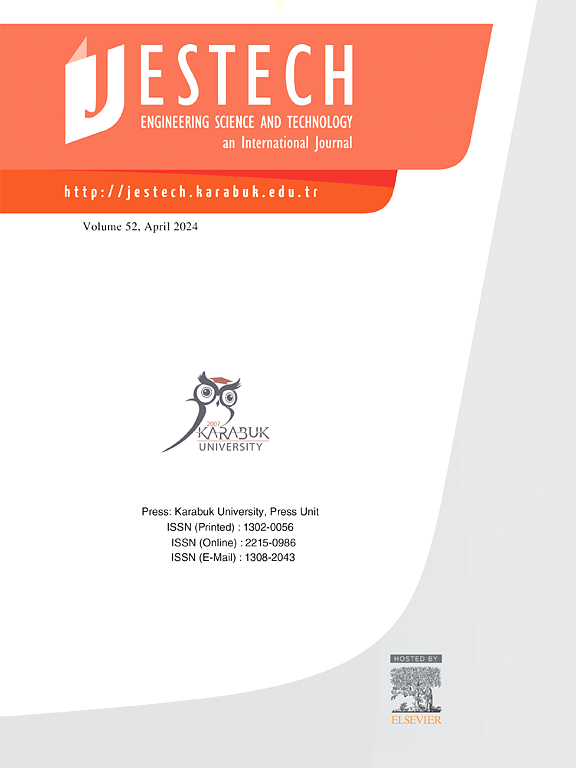Stabilization of recycled and pure soils using mussel shell powder and cement: Experimental evaluation of strength and durability
IF 5.4
2区 工程技术
Q1 ENGINEERING, MULTIDISCIPLINARY
Engineering Science and Technology-An International Journal-Jestech
Pub Date : 2025-04-30
DOI:10.1016/j.jestch.2025.102073
引用次数: 0
Abstract
The integration of industrial and biogenic waste materials in soil stabilization provides an environmentally sustainable alternative to conventional binders. This study evaluates the influence of mussel shell powder (MSP) on both untreated, cemented, and recycled soils, where the recycled soil was initially stabilized with calcium carbide residue, cured for one year, ground into powder, and then re-treated with MSP. Unconfined compression, ultrasonic pulse velocity, and direct shear tests were conducted to assess the strength, compaction, and shear behavior of MSP-stabilized pure, recycled, and cemented soils. The results indicate that MSP addition reduced plasticity and improved soil workability. In recycled soils, 5% MSP provided optimal strength enhancement, while in cemented soils, 20% MSP was required for significant strength gains due to its role in secondary cementation. Freeze-thaw tests demonstrated that MSP-treated soils exhibited up to a 40% reduction in strength loss compared to untreated samples, improving durability in cold climates. The ultrasonic pulse velocity measurements showed strong correlations with unconfined compressive strength, confirming its potential as a non-destructive assessment method for stabilized soils. These findings highlight the potential of MSP as a sustainable stabilizer for improving soil mechanical properties, durability, and resistance to freeze–thaw cycles.
用贻贝粉和水泥稳定再生土和纯土:强度和耐久性的实验评价
工业和生物废料在土壤稳定中的整合为传统粘合剂提供了一种环境可持续的替代品。本研究评估了贻贝粉(MSP)对未处理、胶结和回收土壤的影响,其中回收土壤最初用电石渣稳定,固化一年,磨成粉末,然后用MSP重新处理。通过无侧限压缩、超声脉冲速度和直接剪切试验来评估msp稳定的纯土、再生土和胶结土的强度、压实和剪切性能。结果表明,MSP的加入降低了土壤的塑性,提高了土壤的工作性。在再生土壤中,5%的MSP提供了最佳的强度增强,而在胶结土壤中,由于其在二次胶结中的作用,20%的MSP需要显著的强度增强。冻融试验表明,与未经处理的样品相比,经过msp处理的土壤的强度损失减少了40%,提高了在寒冷气候下的耐久性。超声脉冲速度测量结果与无侧限抗压强度有很强的相关性,证实了其作为稳定土无损评价方法的潜力。这些发现突出了MSP作为一种可持续稳定剂的潜力,可以改善土壤的机械特性、耐久性和抗冻融循环能力。
本文章由计算机程序翻译,如有差异,请以英文原文为准。
求助全文
约1分钟内获得全文
求助全文
来源期刊

Engineering Science and Technology-An International Journal-Jestech
Materials Science-Electronic, Optical and Magnetic Materials
CiteScore
11.20
自引率
3.50%
发文量
153
审稿时长
22 days
期刊介绍:
Engineering Science and Technology, an International Journal (JESTECH) (formerly Technology), a peer-reviewed quarterly engineering journal, publishes both theoretical and experimental high quality papers of permanent interest, not previously published in journals, in the field of engineering and applied science which aims to promote the theory and practice of technology and engineering. In addition to peer-reviewed original research papers, the Editorial Board welcomes original research reports, state-of-the-art reviews and communications in the broadly defined field of engineering science and technology.
The scope of JESTECH includes a wide spectrum of subjects including:
-Electrical/Electronics and Computer Engineering (Biomedical Engineering and Instrumentation; Coding, Cryptography, and Information Protection; Communications, Networks, Mobile Computing and Distributed Systems; Compilers and Operating Systems; Computer Architecture, Parallel Processing, and Dependability; Computer Vision and Robotics; Control Theory; Electromagnetic Waves, Microwave Techniques and Antennas; Embedded Systems; Integrated Circuits, VLSI Design, Testing, and CAD; Microelectromechanical Systems; Microelectronics, and Electronic Devices and Circuits; Power, Energy and Energy Conversion Systems; Signal, Image, and Speech Processing)
-Mechanical and Civil Engineering (Automotive Technologies; Biomechanics; Construction Materials; Design and Manufacturing; Dynamics and Control; Energy Generation, Utilization, Conversion, and Storage; Fluid Mechanics and Hydraulics; Heat and Mass Transfer; Micro-Nano Sciences; Renewable and Sustainable Energy Technologies; Robotics and Mechatronics; Solid Mechanics and Structure; Thermal Sciences)
-Metallurgical and Materials Engineering (Advanced Materials Science; Biomaterials; Ceramic and Inorgnanic Materials; Electronic-Magnetic Materials; Energy and Environment; Materials Characterizastion; Metallurgy; Polymers and Nanocomposites)
 求助内容:
求助内容: 应助结果提醒方式:
应助结果提醒方式:


